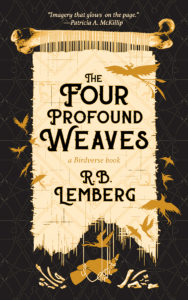
After my first year of participating in the Fantasy Bingo challenge left me starting a bunch of new series and leaving myself on cliffhangers, I decided that this year, I’d get extra ambitious and do a themed card with all sequels. This was before the card was actually released, and one of the squares was Debut Novel/Novella. How, I asked myself, do you find a debut that’s also a sequel? As it turns out, there was an answer, in the form of R.B. Lemberg’s Birdverse. After writing several short stories in this queer, Bird-worshipping realm, Lemberg followed them with their debut novella, The Four Profound Weaves, set in the same world.
The Four Profound Weaves follows two first-person perspective characters journeying together. Uiziya is a magical weaver from a desert society whose teacher abandoned her years back, and who thus had not yet mastered the titular four weaves of wind, sand, song, and bone. The second is a man who has traveled to the desert and used a weave of wind to transform his body to match his soul, but who struggles with his identity as someone who has transformed but whose birth culture disapproves of such transformation. He has not yet taken a male name, and he seeks guidance from the master weaver who had helped him in the past: Uiziya’s absent teacher. Together, they embark on a quest to root their identities, as weaver and as man.
The Four Profound Weaves fits these journeys of self-discovery into a plot—there is a villain, a tyrant who collects magical artifacts, who inevitably comes into direct conflict with the leads—but the plot is a secondary, perhaps even tertiary, concern. What makes the novella worth reading are the character arcs and the prose. The novella is beautifully told, and a pair of tight first-person perspectives make the two journeys feel deeply personal. And the arcs themselves fit the characters very nicely, with both needing to do more than a bit of both self-discovery and of reckoning with other people who have profoundly affected their self-image.
The plot vehicles that drive these character arcs, on the other hand, are a little bit of a disappointment. There’s not much that would be out of place in a generic quest story, and major events seem to occur because the plot requires them, not because they feel inevitable in their own right. It’s certainly not egregious—especially in a tale that isn’t plot-driven in the first place—but it’s enough to notice, and is one aspect of the novella that doesn’t always feel totally natural. On the other hand, some of the peripheral plot elements serve to make the major character arcs even stronger. Whole cultures never take the role of chief antagonists, but on the way to the inevitable final conflict, we see how the culture of the characters’ upbringings shape the trauma that they must overcome late in life. So even if the central plot is unexceptional, the tale as a whole still really manages to come together, and both character arcs go far beyond a simple quest narrative and deliver truly satisfying endings.
Recommended if you like: characters over plot, quality prose.
Can I use it for Bingo? It’s hard mode for First Person Perspective, Debut, and I suppose Found Family.
Overall rating: 16 of Tar Vol’s 20. Four stars on Goodreads.
